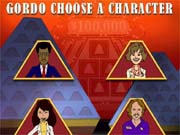In the beginning, there were shows like What's My Line? and I've Got A Secret. Today, we have ratings dynamos such as Who Wants To Be a Millionaire? and ageless wonders such as Jeopardy!. Yet one of television's most successful game shows wasn't there in the formative years of the medium, nor is it with us today. Originally airing in 1973 as the $10,000 Pyramid and culminating in the inflation-ridden early 1990s as the $100,000 Pyramid, it garnered no fewer than nine Emmys during its 18-year run. Now, Sierra On-Line seeks to recapture the glory days of TV game shows in its own virtual replication of the program, aptly entitled The $100,000 Pyramid. It succeeds, but only if you have enough friends gathered together to take advantage of its multiplayer element.

The concept behind the original Pyramid was simple. Each game featured two civilian players, both of whom were paired with a celebrity partner. The two-part process began with the basic game, wherein the two combating teams would alternately choose from six unrelated categories, each of which contained a total of seven "answers." With the clock running, one partner was asked to supply verbal "clues" to the other, who would in turn attempt to guess the correct answer. The team with the most points at the end of the basic game was then granted access to the winner's circle, where six substantially more challenging answers awaited. If you gave a half-dozen correct responses in the winner's circle, you'd walk away with a mighty large jackpot.
The PC version of Pyramid opens in much the same manner as its televised predecessor, with rotating cameras peering down on a flashy but darkened stage and garish graphics cascading across the screen. Music blares, the announcer barks out his preamble, and the studio audience goes wild. Yet as exhilarating as the opening sequence is, the bulk of the game is not nearly so visually impressive.
With the exception of an occasional interlude where the camera pans across a barren stage, Pyramid is a flat 2D world. You'll choose from one of just four generic personas, each of which is merely a minimally animated head positioned in the upper corner of the screen. Answers and clues appear on the monitor without much flash, and you don't get the sense that you're in the studio. This simplistic presentation does little to inspire images of the original show.
The game's audio fares a bit better. Crowd noise ebbs and flows realistically throughout, and the music evokes memories of Pyramid's post-disco heyday. Unfortunately, the unseen announcer is often way off the mark. He'll spout such lines as "Don't worry, I'm sure you'll bounce back next time" or "Don't blame yourself, that was a tough category" after a near-perfect round. And his weak attempts at humor are as repetitive as they are unfunny.
None of the above would really matter if the gameplay were truly stimulating, yet Pyramid simply doesn't reach the heights of its television counterpart. The game's biggest downfall may be its faithfulness to the original formula. As you play, you'll soon realize that the television program generated much of its excitement through the distinct possibility that ordinary people could win obscene amounts of money. As there's nothing here to compensate for the lack of real prizes, the game itself comes across as being somewhat ordinary.
Single-player and two-player Pyramid are particularly disappointing. In these modes your imaginary celebrity partner offers verbal clues, pausing and thinking in much the same way a real person would under the same circumstances. Thusly, you are compelled to continually play the part of the designated answerer, and as such must suffer through your virtual partner's preset speech patterns and the game developer's preprogrammed series of clues. If you don't like the clues, there's nothing you can do about it.
Worse still, the game forces you to manually type in your answers one letter at a time. This is a daunting task for anyone unfamiliar with the keyboard, especially with the added challenge of a constantly ticking clock. Granted, it will automatically correct some spelling errors and finish particularly lengthy responses for you, but it may just as likely reject a perfectly plausible answer. That it doesn't accept keystrokes for a full second after you've entered an incorrect answer causes even more problems.

Conversely, Pyramid's four-player party mode does away with virtual partners and typing altogether, and as such is quite enjoyable. One human teammate faces the screen and provides verbal clues to another human teammate who faces away from the screen and supplies verbal answers. The process continues until all six categories are done and the victorious team heads to the winner's circle. In this mode, Pyramid works like a virtual board game, and a very good one at that.
With four players, The $100,000 Pyramid is a light but entertaining diversion. But if you don't plan on having this many contestants at a time, you'd be well advised to steer clear of Pyramid and pick up the latest copy of You Don't Know Jack instead.